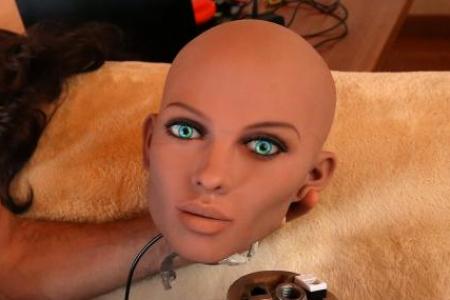Sex robots: Boon for the lonely or a sexist tool?
Rise of sex robots raises complex questions
In the hilly outskirts of sunny Barcelona, Spanish scientist Sergi Santos looks proudly over what appears to be five busty women in tiny shorts and tank tops in his living room.
But look a little closer and it is clear they are not women but silicone sex dolls with wigs and artificial brains that Santos believes will not only earn him money, but may also be used to staff brothels and help combat sex trafficking.
"Hi Samantha," Santos said, switching on one of his dolls.
"I'm here, what's up?" the robot replied, its bright blue eyes staring into nothing as a cable plugged into its neck charges the processor in its "brain".
Artificial intelligence (AI) is making its way into the global sex market, bringing with it a revolution in robotic "sextech" designed to offer sexual gratification.
But the arrival of sex robots has divided opinion.
Inventors like Santos argue they can potentially replace prostitutes, reduce sex trafficking and help lonely people, while critics say they objectify women and normalise sexism and rape.
Roboticists like Mr Santos, 39, who founded Synthea Amatus in 2015 and aims to start selling his sex robots in the coming weeks, starting from about US$2,000 (S$2,740) each, and those from US-based Abyss Creations, are racing to become the first in the world to bring sex robots - which talk and respond to touch - to the consumer market.
Experts say the increasingly life-like robots raise complex issues that should be considered by policymakers and the public - including whether use of such devices should be encouraged to curb prostitution and sex trafficking, for sex offenders, or for people with disabilities.
London-based AI researcher David Levy predicted in his 2007 book Love and Sex with Robots that humans would have sex, fall in love and even marry robots by 2050.
"I don't see anything wrong in using a sex robot to provide sexual satisfaction to people who can't achieve it in relationships with other humans.
"It's much better for lonely and miserable people than no sex at all," he said.
As the technology advances, brothels in global cities will be staffed by robot prostitutes, said Mr Levy. The cost of sex robots will drop - to the point where it will be cheaper than paying for a human prostitute.
He believes that as the stigma of having sex with robots wears off, robotics could disrupt the sex trafficking industry.
"The advent of sex robots will probably reduce the popularity of having sex with a sex worker.
"And if it's going to have that effect, it will also reduce sex trafficking," Mr Levy said.
Globally, nearly 46 million live as slaves, forced to work, sold for sex, trapped in debt bondage or born into servitude, according to the 2016 Global Slavery Index by Australia-based rights group Walk Free Foundation.
However, ethicist and founder of the Campaign Against Sex Robots Kathleen Richardson disagrees that sex robots will curb sex trafficking.
"I don't think sex robots will reduce sex trafficking. It will just become another option on the menu for an already distorted and dehumanised commercial market," said Ms Richardson. - REUTERS
Get The New Paper on your phone with the free TNP app. Download from the Apple App Store or Google Play Store now


